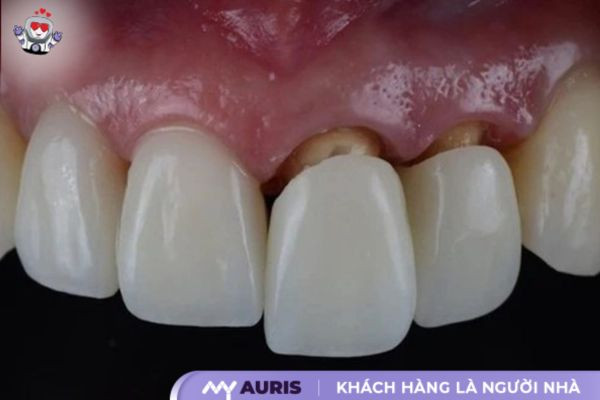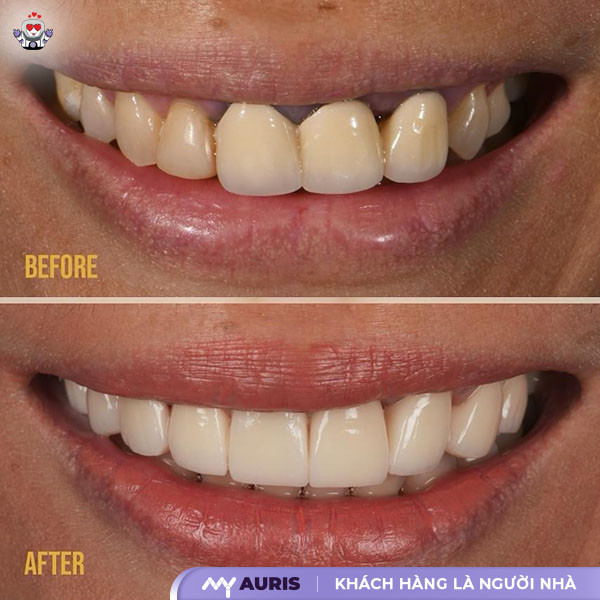Before deciding to get cheap porcelain crowns, many people are often drawn in by the low cost and attractive advertisements from unreliable dental clinics. However, sacrificing oral health for the sake of a low price can lead to a series of serious complications. These consequences not only affect aesthetics but also cause permanent damage to the tooth structure, requiring patients to undergo multiple retreatment sessions, at many times the original cost.
Consequences of Unreliable Cheap Porcelain Crowns
Cheap porcelain crowns are not just a wrong choice but also a potential long-term danger to oral health. Users need to understand that a low price never comes with high quality. Prioritize choosing reputable dental clinics with specialized doctors and transparent materials to protect your teeth – your irreplaceable assets. Below are the most common typical complications.
Prolonged Tooth Sensitivity and Pain
When low-quality porcelain crowns are attached to the ground-down natural teeth, if the dentist’s skill is not up to standard or unreliable bonding material is used, you will feel sensitivity even when not eating or drinking. This is a sign of pulp damage or a poor fit between the crown and the tooth abutment.
Solutions:
- Seek re-examination promptly at a reputable dental clinic.
- Check if the crown is loose or ill-fitting.
- Avoid excessively cold or hot foods to temporarily alleviate pain.

Gingivitis, Gum Recession, Bone Loss
When the crown does not fit snugly, bacteria can easily penetrate the gums, causing inflammation. If not addressed promptly, gum recession can expose the tooth root, leading to jawbone loss and severely affecting soft tissues and the tooth abutment.
Common causes:
- Improper crowning technique.
- Porcelain material of unknown origin, prone to irritation.
- Inexperienced dentists failing to assess gum tissue condition before crowning.
Solutions:
- The crown needs to be removed, and gingivitis treated with antibiotics and professional cleaning.
- Gum tissue regeneration if necessary.
Malocclusion, Impaired Chewing Function
If the crown is improperly placed or the bite is not accurately adjusted, the patient will experience discomfort when chewing, difficulty speaking, or jaw pain during sleep. In the long run, this can lead to jaw muscle fatigue, temporal pain, and even changes in the jawbone structure.
Warning signs:
- Feeling that the jaw does not close naturally.
- Chewing on one side to alleviate pain.
- Pain in both temples when yawning or smiling.
Treatment:
- X-rays to re-examine the tooth structure.
- The crown needs to be remade to meet physiological bite standards.

Crown Damage, Detachment Due to Improper Bonding Technique
One of the common consequences of cheap porcelain crowns is that the crown is prone to detachment during chewing. The main reasons stem from the use of inexpensive bonding agents, non-adherence to the bonding procedure, and the lack of stability checks.
Note:
- Avoid eating hard foods immediately after getting crowns.
- If the crown detaches multiple times, it needs to be completely replaced with a high-quality porcelain crown.
Risk of Permanent Damage to Natural Teeth
Once natural teeth are ground down for crowning, they cannot be restored. If the porcelain crown procedure is not performed correctly, there is a very high risk of pulp inflammation and necrosis of the natural tooth. In many cases, patients have to extract the tooth and get an implant or a dental bridge.
Consequences:
- Double the cost of retreatment.
- Causes prolonged pain, affecting overall health.
- Loss of trust in dental treatment.
Why Are Cheap Porcelain Crowns Prone to Complications?
The article below will help you clearly see the true picture of the low-cost dental industry, enabling you to choose safe and standard cosmetic crowning services:
Poor Quality, Unknown Origin Porcelain Materials
Porcelain crowns are restorative materials that directly contact gum tissue, tooth abutments, and natural teeth. If the material is not of good quality, complications can quickly arise within a few weeks of use, causing soft tissue irritation. Users are prone to gingivitis after crowning, discoloration of the porcelain, and even chipping or fracturing of the porcelain within a few months of use.
Some types of Chinese porcelain crowns are only 1/3 the price of high-quality porcelain crowns from Germany, Japan, or the US. However, this difference is not just in price but also in durability, safety, and biocompatibility.

Lack of Standard Dental Equipment
Crowning teeth not only relies on the dentist’s skill but also requires precise supporting equipment. From 3D imaging machines, digital impression scanners to sterilization systems… all must meet standards. However, cheap dental clinics often cut investment costs by using old equipment, equipment not calibrated periodically, or entirely lacking essential tools.
To assess a reputable clinic, you should observe the facilities, technology, and sterilization system. Standard dental clinics usually publicize clear crowning procedures, ensure sterility, and utilize modern equipment.
Inexperienced Doctors, Careless Work, Incorrect Techniques
One of the leading causes of complications from cheap porcelain crowns is inexperienced dentists. In many unlicensed facilities, the person directly grinding teeth and placing crowns is not a licensed dentist but an apprentice without proper qualifications.
You should check the dentist’s qualifications, professional license, and years of experience. Reputable dental clinics always publicize their professional team and have clear, transparent treatment procedures.
The crowning technique requires high precision at every step, from taking impressions and designing the crown to permanent bonding. If performed incorrectly, the consequences will be ill-fitting crowns, discomfort when chewing, gaps causing bad breath and gum inflammation. Severe cases can lead to pulp necrosis of the natural tooth, prolonged pain, or permanent tooth loss.
Clinics Without Operating Licenses
Before choosing a dental clinic, you need to check its operating license, registration number, and reviews from real users. Avoid being lured by attractive promotions or discounts while overlooking crucial legal factors. These establishments often rent small premises, advertise heavily on social media, promising quick, cheap porcelain crowns but without warranty or post-treatment support.
The serious problem is that when complications occur, users have no recourse for complaints, no support for repairs, or refunds. Some cases are even denied retreatment when the natural teeth have been severely damaged.
Comparison Between Cheap Porcelain Crowns and Premium Porcelain Crowns
If you are hesitant between cheap porcelain crowns and premium porcelain crowns, understanding the differences below will help you make a correct and safe decision.
Comparison Table: Cheap Porcelain Crowns vs. Premium Porcelain Crowns
| Criteria | Cheap Porcelain Crowns | Premium Porcelain Crowns |
| Material | Materials of unknown origin, mixed, easily fractured, prone to discoloration | High-quality, genuine materials (zirconia, lithium disilicate…), meeting medical standards |
| Product Origin | Mainly from China or not clearly disclosed | Originating from Germany, USA, Japan, Korea, with inspection certificates |
| Dentist’s Skill | Lack of expertise, inexperienced, not properly trained | Specialist dentists with certifications and experience in porcelain crown restoration |
| Execution Technique | Excessive tooth grinding, incorrect proportion, prone to pulp damage | Optimal tooth grinding, precisely preserving natural tooth structure |
| Supporting Equipment | Basic, outdated, lacking scanning technology, weak sterilization equipment | 3D scanning machines, precise grinding equipment, modern sterilization systems |
| Lifespan | Short: 1 – 3 years, prone to detachment, fracture, yellowing | Long: 10 – 20 years with good care |
| Fit and Chewing | Often loose at the gum line, uncomfortable, malocclusion | Snugly fits natural teeth, natural chewing, no bite interference |
| Aesthetics | Prone to dullness, unnatural appearance, poor light reflection | Natural color, even tone, reflects light like natural teeth |
| Risk of Complications | High: gingivitis, gum recession, infection, bone loss, damage to natural teeth | Very low if performed with correct technique |
| Warranty Policy | Unclear, refusal to fix errors | Specific warranty policy (3 – 10 years depending on porcelain type) |
| Cost | Low: 500,000 – 2,000,000 VND/tooth | High: 4,000,000 – 10,000,000 VND/tooth, depending on material and clinic |
| Suitable for | Those seeking low cost, lacking information, accepting risks | Those prioritizing quality, aesthetics, and long-term dental health |
Warning Signs of Complications After Getting Cheap Porcelain Crowns
Below are clear symptoms you should be aware of:
Prolonged Pain, No Relief After 1 Week
After getting porcelain crowns, mild pain is normal for the first few days. However, if the pain persists for more than 7 days and shows no signs of subsiding, this is a warning sign that there might be an issue with the crowning procedure.
If you experience dull pain or severe throbbing when chewing, or drinking cold or hot water, you need to visit a reputable dental clinic for a re-examination. You should not self-medicate with painkillers as this can mask symptoms and delay the treatment process.
Bleeding Gums, Bad Breath
One of the clear signs of complications after getting cheap porcelain crowns is frequent gum bleeding and an unpleasant odor in the mouth. This indicates gingivitis or periodontitis – caused by ill-fitting crowns that create gaps for bacterial plaque accumulation.
This condition often begins with swelling, redness around the base of the crowned tooth, and bleeding when brushing or eating. Persistent bad breath, even with thorough oral hygiene, indicates that bacteria have deeply infiltrated beneath the crown.
Loose Crowns, Discomfort When Chewing
After placement, porcelain crowns must ensure a snug fit and complete compatibility with natural teeth and jaw structure. If you feel your crown is loose, wobbly when eating, or constantly uncomfortable, this is a sign that the crowning procedure was not up to standard.
If this condition is allowed to persist, the crown may fall out while eating or cause damage to adjacent teeth. Patients should temporarily stop using the crown and visit the clinic to readjust the bite and replace it with a new, standard-compliant crown.
Bite Changes, Difficulty Speaking, or Facial Asymmetry
The bite is a crucial factor in maintaining proper chewing ability and clear pronunciation. If you find yourself speaking with a lisp, having difficulty pronouncing words, or feeling a jaw misalignment, the cause may stem from a crown placed in the wrong position or at an incorrect height.
This error not only causes discomfort but also gradually shifts the jaw structure over time, leading to long-term effects on the temporomandibular joint. Adjusting the bite after improperly placed cheap porcelain crowns requires an experienced dentist and modern equipment.

What to Do If You’ve Had Cheap Porcelain Crowns and Experienced Complications?
When symptoms such as prolonged sensitivity, tooth pain when chewing, bad breath, loose crowns, or swollen, red gums appear, you should not wait. Trying to endure it can lead to bone loss or even the loss of your natural teeth. You need to visit a reputable dental clinic with a restorative specialist for a thorough examination.
The dentist will ask you to get X-rays to assess the condition of your natural teeth, abutments, and crowns. If the porcelain crowns are of poor quality or bonded incorrectly, they can easily cause tooth infection, malocclusion, and gum recession. This examination will help determine if the crowns need to be removed for restoration.
Once the cause of complications is determined to be due to cheap, unregulated porcelain crowns, materials of unknown origin, or incorrect technique, the dentist will recommend removing the crowns. Afterward, gum inflammation needs to be treated, tooth tissue disinfected, and the tooth abutment properly prepared again. In some cases, root canal treatment or bone grafting may be necessary if the damage is severe.
After treatment, you should choose aesthetic dental services that follow standard crowning procedures. Prioritize high-quality porcelain crowns with clear origins, genuine warranties, and performed by highly skilled dentists in the dental field. This ensures aesthetics, a snug fit, safety, and a longer lifespan for your teeth.
After getting your teeth redone, it is crucial to maintain meticulous oral hygiene, using a soft-bristled toothbrush, dental floss, and specialized mouthwash. Regular check-ups every 3–6 months are recommended to check the adhesion, fit, and condition of the gum tissue around the porcelain crowns. Maintaining good care will reduce the risk of recurring complications.
Getting cheap porcelain crowns at an unreliable facility can cause severe damage if not addressed promptly. Do not let the consequences linger, affecting both chewing function and facial aesthetics. If you have already had cheap porcelain crowns and experienced complications, proactively seek a reputable dental clinic for retreatment with correct techniques, appropriate materials, and long-term safety.
You might also be interested in:
📰 Are 500k VND Porcelain Crowns Worth the Investment?
📰 Do 700k VND Porcelain Crowns Have Any Side Effects?
📰 Are 800k VND Porcelain Crowns Any Good?





